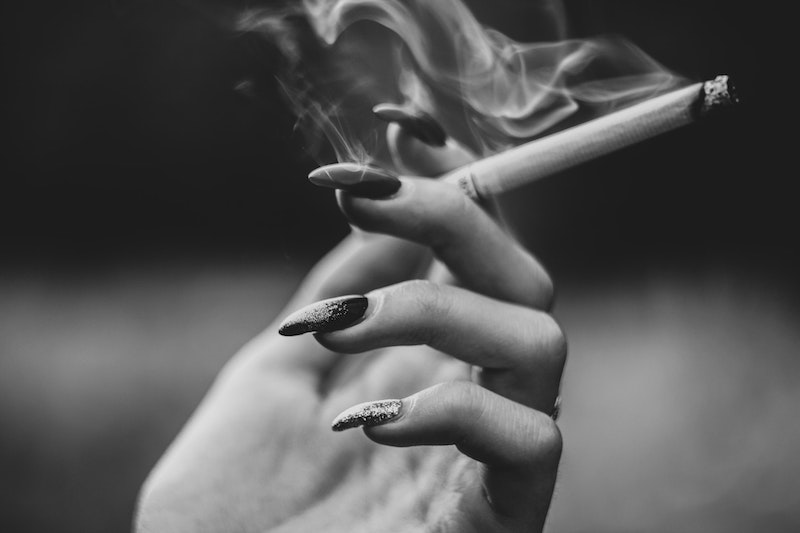Besides being detrimental to your health, smoking can also hurt your skin.
The first thing you think of when someone mentions is how smoking can take a toll on your skin, causing premature skin aging.
While this is true, smoking can also change the skin, and unfortunately, not for the better.
But does smoking cause acne?
Yes, smoking can cause acne, as tobacco contains substances that stimulate neurotransmitters that alter cell behavior and oil composition, leading to the overproduction of keratin and sebum and increased pore clogging, which results in acne.
Therefore, in this article, I will explain the connection between smoking and acne, as well as how smoking can affect the skin in other ways besides causing pimples and what you can do to reverse the damage.
What Causes Acne?

Your skin has tiny holes or passages called pores.
Each pore of your skin is the opening to a follicle, which is made up of a single hair and a sebaceous (oil) gland.
The oil gland releases an oily substance called sebum, which travels up to the hair, out of the pore, and remains on the skin.
This natural moisturizer keeps your skin soft, smooth, and protected from external aggressors such as harmful bacteria, pollution in the air, UV damage, etc.
However, when the sebaceous glands produce excess oil, or the oil itself is of poor quality (for example, oxidized), it may be harder to push through the pore and toward the skin surface.
This irregularity can cause the oil to remain stuck inside the pore, where it will mix with dead skin cells that are now also having a hard time pushing to the skin’s surface due to the oil blocking their path.
Once the two mix together, they will form a sticky, waxy plug that will attract a particular strain of bacteria (known as the acne-causing bacteria) that feed on this form of cellular debris and proliferate.
Finally, when the bacteria eventually overgrow, it is promptly detected by your immune system, which immediately sends white blood cells to the area to fight the overgrowth of bacteria it deems a foreign body.
This “battle” results in inflammation, with symptoms such as swelling, redness, and pus forming a pimple.
This is how acne is formed, and understanding this process can make acne much easier to maintain and control.
How Does Smoking Cause Acne?
While smoking is likely not the only factor behind your acne, it can trigger various reactions in the body that lead to the formation of non-inflammatory acne, such as blackheads, and inflammatory acne, such as papules, pustules, and cysts.
Here are a few ways smoking can cause acne or exacerbate existing pimples:
Smoking Accelerates Oxidation
Smoking has been linked to a specific type of non-inflammatory acne called Acneiform Facial Acne (AFA), most prevalent amongst female smokers.
AFA, often referred to as ‘smoker’s face,’ is characterized by small and large clogged pores with a few inflammatory lesions.
The key to understanding how smoking influences acne lies in nicotine’s effect on sebaceous glands, the producers of pore-clogging sebum.
Nicotine stimulates acetylcholine, a neurotransmitter that affects cell behavior.
This leads to an excess production of keratin, a skin protein, and alters the production and composition of sebum.
It also reduces antioxidants and increases oxidation, particularly in squalene, which is a major component of sebum.
Oxidized sebum, common in smokers, has difficulty traveling through the pores to the skin surface.
It gets trapped inside the pore, mixing with dead skin cells to form a clog, which breeds acne-causing bacteria, leading to inflammation and pimples.
Therefore, smoking intensifies acne by changing skin cell behavior, increasing keratin and sebum production, and causing oxidative stress.
Smoking Depletes the Skin of Nutrients
Smoking narrows the small blood vessels that transport macronutrients such as carbohydrates, proteins, lipids, and micronutrients such as vitamins and minerals to the skin.
This means that the nutrient and oxygen supply to the skin reduces, and the skin becomes drained of nutrients, which makes it challenging to fight against harmful pathogens.
When the skin is drained of nutrients, it will try to protect itself by overproducing sebum to replenish the lack of moisture provided by these essential nutrients as well as maintain the barrier function.
The excess sebum can then become trapped inside the pore and harden, creating a small sebaceous plug, which is essentially called a comedo or a small, non-inflamed bump or blemish on the skin.
These can occur anywhere on the body but tend to be most apparent on the face because this is the most exposed area.
Smoking Dehydrates the Skin
Smoking can exacerbate acne through several mechanisms associated with skin dehydration.
When the skin is deprived of hydration, it reacts by overproducing sebum, an oil intended to moisturize the skin.
However, excessive sebum can clog pores, a primary factor in acne development.
Further, the diminished supply of nutrients and oxygen due to smoking impairs the skin’s capacity to combat bacteria and regenerate new cells effectively.
This results in an accumulation of dead skin cells that combine with surplus sebum, leading to further pore blockage.
Moreover, smoking-induced damage to collagen and elastin weakens the skin’s resilience, making it more prone to acne scarring.
These scars tend to heal slower on a smoker’s skin due to the insufficient supply of necessary nutrients and oxygen.
Lastly, the removal of natural oils from the skin’s surface by the heat and smoke of cigarettes disrupts the skin’s pH balance.
This imbalance can foster bacterial growth and inflammation, further contributing to acne.
In essence, smoking’s dehydrating effects can worsen acne in several ways, making smoking a direct and indirect factor that plays a role in the formation of this inflammatory condition.
What Does Smoking Do To Your Skin?

Smoking can cause a lack of nutrients and oxygen, dehydration, and excess sebum production at the same time, which are factors that can drastically affect your skin.
Here are some other skin changes you may notice if you are a smoker:
Wrinkles
Smoking is notoriously known for destroying antioxidant vitamins C and E in our bodies.
While vitamin E is an essential antioxidant for our immune system, vitamin C is necessary for supporting collagen production.
Chemicals present in tobacco attack proteins that hold collagen and elastin fibers together, and when the production of collagen decreases, this will inevitably lead to sagging and wrinkling of the skin.
Moreover, wrinkles known as “smoker’s lines” start appearing around the mouth from pursing your lips to drawing on a cigarette repeatedly.
Crow’s feet are another common type of wrinkles that develop faster in smokers due to the tendency to squint to prevent cigarette smoke from getting into the eyes.
Therefore, smoking not only depletes essential vitamins and disrupts collagen production, causing wrinkles from the inside out, but it also contributes to physical behaviors that speed up the formation of wrinkles.
‘Smoker’s Complexion’
Besides wrinkles, smoking can lead to a sallow, yellowish complexion.
This is because carbon monoxide released from cigarettes narrows the blood vessels and reduces oxygen and nutrient supply through the blood, giving the skin a yellow tinge over time.
While a healthy blood supply is recognizable by rosy cheeks and an overall nice complexion, the same cannot be said for long-time smokers whose complexion looks greyish.
Some smokers may appear pale, while others develop uneven coloring.
These changes can begin at a young age and develop dramatically over the years.
Vasculitis
Vasculitis is a condition involving inflamed blood vessels in some parts of the body.
Smoking affects blood flow and constricts blood vessels. Blood vessels in certain areas can become blocked, resulting in pain and tissue damage.
Extreme forms of vasculitis can lead to ulcers on the skin, which in even more severe cases can turn into gangrene (tissue death), and loss of the appendage can occur.
Stains
Tobacco contains chemicals that are dangerous and toxic, and smokers are well familiar with these through stains on their fingers and nails.
While it is almost impossible to remove these stains with soap and water, luckily, they tend to fade after some time of quitting smoking.
Psoriasis
Psoriasis is a skin condition characterized by red, itchy, and scaly patches on the skin. It can be hereditary or induced by certain lifestyle habits, with smoking being a significant risk factor.
This can be blamed on the nicotine in cigarettes, as this substance affects the immune system, can trigger skin inflammation, and can affect the growth of skin cells.
Increased cell growth can lead to the development of psoriasis, which is why smokers are prone to a form of psoriasis called palmoplantar pustulosis.
Speculation that stress-coping techniques smokers employ (smoking cigarettes) may put smokers at additional risk of developing psoriasis.
If you are a smoker, have you noticed that cigarettes (or the lack of cigarettes, for that matter) can make you extremely anxious and nervous?
7 Ways To Quit Smoking (& Achieve Healthy Looking Skin)

Quitting cigarettes after being a long-time smoker can cause immense shock and stress to the system as it is.
After all, smoking is not only a psychological habit but also a physical addiction that can cause withdrawal symptoms, which can be a challenging occurrence to get past.
Eliminating the regular nicotine fix can throw you into experiencing physical withdrawal, which might cause you to become more nervous and anxious as you try to quit.
However, while the temptation will be there for the first couple of months, there are effective ways you could try that can help you quit smoking.
Here are some of them:
Set a Date
Choose a date within the next two weeks.
This will give you enough time to prepare without losing the motivation to quit.
If you mainly smoke at work, quit on the weekend so you have a few days to adjust to the change.
Identify Your Triggers
You can help yourself by identifying the things that make you want to smoke.
Be it specific situations, occasions, activities, feelings, or people.
Identifying and accepting these things is important to help you resist temptation easier.
Tell Your Family and Close Friends
Let the people who are around you daily know about your plan to quit smoking and ask for their support and encouragement to stop.
Look for someone who wants to stop smoking as well so you can have someone to talk to when cravings kick in.
Avoid Alcohol
Many people smoke when they drink.
Alcohol and cigarettes go hand in hand, and while moderate amounts of the first one can be tolerated, the second one is clearly detrimental to your health.
Try switching to non-alcoholic drinks or drink in places where smoking inside is prohibited.
Alternatively, get some snacks to keep your hands and mouth busy and the thoughts of having a cigarette away.
Coping With Nicotine Withdrawal
Once you stop smoking, you will likely experience a number of physical symptoms as your body withdraws from nicotine.
This withdrawal begins quickly, usually starting within an hour of the last cigarette and peaking two to three days later.
Withdrawal symptoms can last up to several weeks and slightly differ from person to person.
These may include:
- Cravings.
- Frustration or anger.
- Anxiety or nervousness.
- Difficulty concentrating.
- Increased appetite.
- Tremors.
- Increased coughing.
Withdrawal symptoms can be unpleasant, but it is important to remember that they are only temporary.
They will get better in a few weeks’ time as the toxins are slowly but surely flushed from your body.
Distract Yourself
It is important to manage to distract yourself from cigarette cravings
You can do this by performing the simplest chores like doing the dishes, turning on the TV, showering, or simply calling a friend.
Remind Yourself Why You Quit
This is one of the most helpful ways to stay on track when deciding to quit smoking.
Focus on your reasons for quitting, including health benefits.
Chances are that you will notice positive changes in your health and even improvement in your appearance, so you will definitely have something positive to keep you going.
Think of the money you are saving, enhanced self-esteem, smelling good, and lowering your risk for heart disease, lung cancer, etc.
Don’t forget that cravings come and go, and it’s only a matter of seconds before they pass.
Therefore, you only need to stay focused on something else for a few seconds, and thinking of your achievements will definitely help.
Frequently Asked Questions
Does Smoking Cause Acne Scars?
Smoking can delay the healing process of acne, making it more likely for scars to form.
Additionally, smoking can restrict blood flow and decrease oxygen levels in the skin, which are important for wound healing, thus prolonging the fading of acne scars.
In addition, smoking can also increase oil production in the skin, leading to clogged pores and potential breakouts and ultimately resulting in more acne scars.
Does Smoking Cause Acne Around Mouth?
Smoking can cause acne in various face areas, including around the mouth.
This is because smoking can irritate, inflame, and dehydrate the skin, leading to clogged pores and breakouts.
Furthermore, smoking can also affect hormone levels, which can contribute to acne development around the mouth.
Finally, if you touch your mouth frequently while smoking, you can transfer bacteria and oils from your hands onto your skin, further aggravating acne in this area.
Is Vape Causing Acne?
There is not enough research to definitively say whether vaping causes acne, but there are potential factors that may contribute to breakouts when vaping.
For one, the chemicals and toxins in vaping products can irritate and inflame the skin, leading to clogged pores and acne.
Additionally, nicotine in vape juice can also affect hormone levels and increase oil production in the skin, both of which can contribute to acne development.
Finally, constantly inhaling and exhaling vapor containing various oils can cause these to stick to the skin, further clogging pores and leading to acne.

My name is Simone and I am a certified skin specialist. I created this website to teach my readers how to take great care of their skin and I also like to occasionally share my honest opinions on skincare products I’ve tried. You can learn more about me here.
